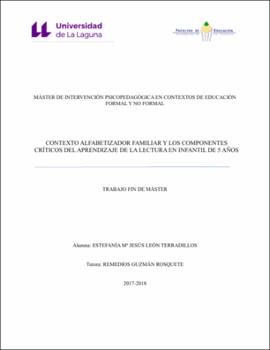Contexto alfabetizador familiar y los componentes críticos del aprendizaje de la lectura en Infantil de 5 años
Fecha
2018Resumen
La lectura es una habilidad importante que permite el acceso a cualquier aprendizaje, pero su aprendizaje no es un proceso sencillo, ya que implica el desarrollo de múltiples habilidades cognitivas y lingüísticas. Tradicionalmente se ha considerado que el desarrollo de estas habilidades era únicamente responsabilidad de la escuela. Sin embargo, cada vez recobra más fuerza el papel que juega el contexto familiar en potenciar las habilidades prelectoras de forma temprana, a través de experiencias y de los recursos que la familia proporciona. Este trabajo tuvo por finalidad de identificar la relación que existía entre el contexto alfabetizador familiar y las habilidades prelectoras en alumnado del último curso de Educación Infantil. Se seleccionó una muestra de 159 alumnos/as y a sus padres y madres. Para conocer el contexto alfabetizador familiar se diseñó un cuestionario ad hoc y se evaluaron las habilidades prelectoras (vocabulario, conciencia fonológica, conocimiento alfabético y conocimiento de lo impreso) mediante la prueba IPAL. Los resultados del contexto alfabetizador mostraron que las familias contaban con recursos para la alfabetización y que las familias realizaban con bastante frecuencia actividades formales relacionadas con las habilidades prelectoras. No se encontraron diferencias significativas entre niños y niñas en relación a las habilidades prelectoras, pero si se hallaron estas diferencias según el tipo de centro (públicos vs privados). Finalmente se encontró que no existe relación significativa entre el estatus de riesgo del alumnado en las habilidades prelectoras y el contexto alfabetizador familiar. Reading is an important skill that allows access to any learning, but its learning is not a straightforward process, it entails the development of multiple cognitive and linguistic skills. Traditionally it has been considered that the development of these skills was responsibility of the school. Nevertheless, it is increasingly regaining more power than the role that the family context allows in encouraging early preaching skills, through the experiences and resources that the family provides. This work was purposed to the relationship between the Home literacy Enviroment (HLE) and the pre-reading skills in the last year of children's education. An exhibit of 159 students and their parents was selected. In order to know the HLE, an ad hoc questionnaire was designed and pre-reading skills (vocabulary, phonological awareness, alphabetic knowledge and knowledge of print) were evaluated using the IPAL test. The results of the literacy context shown that families had resources for literacy and that families performed quite often formal activities related to pre-reading skills. No differences were found in preferences between boys and girls in relation to pre-reading skills, but there were differences according to the type of center (public vs. private). Lastly, it was found that there is no significant relationship between the student's risk status in pre-reading skills and the HLE.




